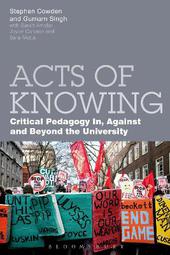
|
Acts of Knowing: Critical Pedagogy in, Against and Beyond the University
Paperback / softback
Main Details
| Title |
Acts of Knowing: Critical Pedagogy in, Against and Beyond the University
|
| Authors and Contributors |
By (author) Stephen Cowden
|
|
By (author) Gurnam Singh
|
| Physical Properties |
| Format:Paperback / softback | | Pages:240 | | Dimensions(mm): Height 229,Width 152 |
|
| ISBN/Barcode |
9781441105318
|
| Classifications | Dewey:378.001 |
|---|
| Audience | | Tertiary Education (US: College) | | Professional & Vocational | |
|---|
|
Publishing Details |
| Publisher |
Bloomsbury Publishing Plc
|
| Imprint |
Bloomsbury Academic USA
|
| Publication Date |
23 May 2013 |
| Publication Country |
United States
|
Description
This provocative book's starting point is a deep and profound concern about the commodification of knowledge within the contemporary university. Acts of Knowing aims to provide readers with a means of understanding the issues from the perspective of Critical Pedagogy; an educational philosophy which believes that 'knowing' must be freed from the constraints of the financial and managerialist logics which dominate the contemporary university. Critical Pedagogy is important for three key reasons: it conceptualises pedagogy as a process of engagement between the teacher and taught; secondly that that engagement is based on an underlying humanistic view about human worth and value; and thirdly that the 'knowing' which can come out of this engagement needs to be understood essentially as exchange between people, rather than a financial exchange. Cowden and Singh argue that the conception of education as simply a means for securing economic returns for the individual and for the society's positioning in a global marketplace, represents a fundamentally impoverished conception of education, which impoverishes not just individuals, but society as a whole.
Author Biography
Stephen Cowden has taught for the last 10 years at Coventry University, UK. He has a background in political activism in Melbourne, Australia and in London, and has worked as a frontline care worker and Social Worker in the UK before entering academia. He is interested in the Critical Pedagogical tradition as a way of working specifically with students from non-traditional university backgrounds, and also as a methodology for Social Work practice. Gurnam Singh is a Principal Lecturer in Social Work and Co-Director of the Applied Research Group in Social Exclusion in Social Care (SISC) at Coventry University, UK. He was awarded a National Teaching Fellowship by the Higher Education Academy in 2009. Throughout his adult life he has been active in numerous social movements whose aim has been to fight for social and economic justice.
ReviewsIn times of enormous attacks on education, when working conditions in the sector are cut and access to education is increasingly limited to those, who can afford to pay for it, this book is like a breath of fresh air. It not only warns against the consequences of the marketisation of education, it also offers exciting alternative ways of how education can be delivered through the tools of critical pedagogy aimed at nurturing a critical consciousness amongst teachers and students, which in turn may become the platform for alternatives. I strongly recommend this book to everyone interested in retaining education as a social good and source for transformative change. This is a must-read. Acts of Knowing hits at the very heart of the crisis in the university today and provides an explicit critique of the global impact of neoliberalism on the hearts, minds, and bodies of teachers and students. This brilliant compilation of radical essays also speaks boldly to a powerful educational praxis of possibility and a revolutionary vision of hope and transformation. It is truly an outstanding contribution to an evolving (and much needed) international literature on critical pedagogy and higher education. Reflective Teaching For years we have needed a text such as Acts of Knowing. Crisis in the University and the central place of pedagogy within it has always been troublesome, but never more so than now. In this groundbreaking text Cowden, Singh and colleagues bring to the fore and remind us of the central players (in the forms of theorists) who we should be using in the fight against the commodification of knowledges, pedagogies and practices across the landscape of the higher education in the 21st century. It is a text that should not be on every senior manager's book shelf, but open on their desks.
|